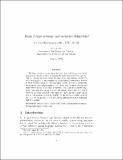Browsing LCS Publications by Title
Now showing items 863-882 of 1163
-
QoS Preserving Totally Ordered Multicast
(2000-01)This paper studies the Quality of Service (QoS) guarantees of totally ordered multicast algorithms. The paper shows that totally ordered multicast can coexist with guaranteed predictable delays in certain network models. ... -
Qualitative Mathematical Reasoning
(1984-11)Qualitative analysis is the study of abstract causal reasoning. It explores the mechanisms whereby humans analyze complex systems abstractly, while ignoring unimportant and unknown low-level details. Previous research ... -
Qualitative Simulation in Medical Physiology: A Progress Report
(1985-06)This progress report describes the current status of the application of the QSIM qualitative simulation representation and algorithm to mechanisms drawn from medical physiology. QSIM takes a qualitative description of the ... -
Qualitative Simulation of Mechanisms
(1985-04)Qualitative simulation is a key inference process in qualitative causal reasoning. However, the precise meaning of the different proposals and their relation with differential equations is often unclear. In this paper, we ... -
Quantitative Performance Modeling of Scientific Computations
(1995-05)The first part of the thesis demonstrates that the performance of programs can be predicted accurately, automatically, and rapidly using a method called benchmapping. The key aspects benchmapping are: automatic creation ... -
Queueing Models for File Memory Operation
(1965-10)A model for the auxiliary memory function of a segmented, multiprocessor, time-shared computer system is set up. A drum system in particular is discussed, although no loss of generality is implied by limiting the discussion ... -
RAMBO II: Rapidly Reconfigurable Atomic Memory for Dynamic Networks
(2003-03)Future civilian rescue and military operations will depend on a complex system of communicating devices that can operate in highly dynamic environments. In order to present a consistent view of a complex world, these devices ... -
A Random Server Model for Private Information Retrieval (or Information Theoretic PIR Avoiding Database Replication
(1997-04)Private information retrieval (PIR) schemes provide a user with information from a database while keeping his query secret from the database manager. We propose a new model for PIR, utilizing auxiliary random servers ... -
A Randomized Data Structure for Ordered Sets
(1986-05)In this paper, we consider a simple randomized data structure for representing ordered sets, and give a precise combinatorial analysis of the time required to perform various operations. In addition to a practical data ... -
Randomized Encryption Techniques
(1983-01)A randomized encryption procedure enciphers a message by randomly choosing a ciphertext from a set of ciphertexts corresponding to the message under the current encryption key. At the cost of increasing the required ... -
Randomized Routing on Fat-trees
(1986-05)Fat-trees are a class of routing networks for hardware-efficient paralle computation. This paper presents a randomized algorithm for routing messages on a fat-tree. The quality of the algorithm is measured in terms of the ... -
Randomness and Robustness in Hypercube Computation
(1991-04)In this thesis we explore means by which hypercubes can compute despite faulty processors and links. We also study techniques which enable hypercubes to simulate dynamically changing networks and data structures. -
Randomness Versus Non-Determinism in Distributed Computing
(1994-10)This thesis is devoted to the analysis and illustration of the effects of the interplay between randomness and non-determinism in randomized computing. Using ideas from game theory , we provide a general model for randomized ... -
Rank 2 Type Systems and Recursive Definitions
(1995-11)We demonstrate an equivalence between the rank 2 fragments of the polymorphic lambda calculus (System F) and the intersection type discipline: exactly the same terms are typable in each system. An immediate consequence ... -
Rank 2 Type Systems and Recursive Definitions
(1995-08)We demonstrate an equivalence between the rank 2 fragments of the polymorphic lambda calculus (System F) and the intersection type discipline: exactly the same terms are typable in each system. An immediate consequence is ... -
Rate-based Congestion Control in Networks with Smart Links
(1990-01)I use a network simulator to explore rate-based congestion control in networks with "smart" links that can feed back information to tell senders to adjust their transmission rates. This method differs in a very important ... -
Ratings in Distributed Systems: A Bayesian Approach
(2001-05)For distributed systems at large and e-commerce systems in particular, ratings play an increasingly important role. Rating confer reputation measures about sources. This paper reports our formalization of the rating process. ...



















